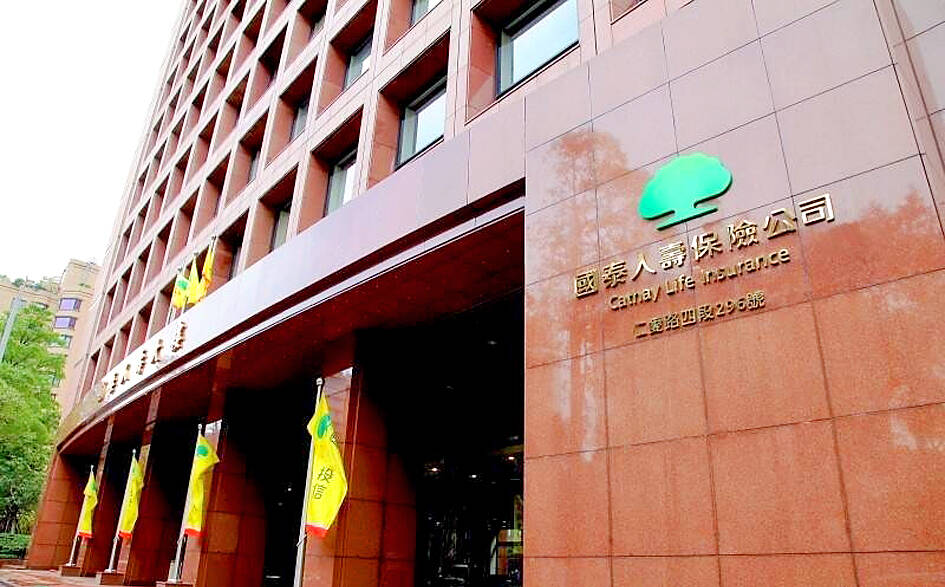Taiwanese life insurers are issuing an unprecedented amount of bonds that pose more risks to investors, as they rush to improve their finances before a deadline to shore up capital.
Already this year, the nation’s seven major insurance firms have sold US$2.4 billion of subordinated notes that put investors behind other debt holders for claims on assets in the event of any bankruptcy.
That is a record for the first half of a year, data compiled by Bloomberg showed. Insurers have also announced plans for a record NT$158 billion (US$4.88 billion) of issuance over the full year.

Photo: Wu Chi-lun, Taipei Times
Long-term subordinated bonds have become a favored channel for fund raising, as Taiwanese life insurers seek to build up their assets before a new accounting system is introduced by 2026 that would require higher financial standards.
Insurers were only given permission to issue such bonds with maturities of more than 10 years in April last year. The vast majority are denominated in New Taiwan dollars, although some are in the US currency.
“We expect Taiwanese insurers to continue to issue subordinated debt to enhance their capital adequacy and the level of issuance is likely to remain high in 2024 and 2025,” Fitch Ratings Ltd senior director Terrence Wong (王長泰) said in Hong Kong.
The subordinated bonds are popular with investors as their yields stand out from the relative low ones that have long predominated in Taiwan’s fixed-income market.
Buyers include traditional investors such as government funds and financial institutions, along with less frequent purchasers, including non-financial companies and high net-worth individuals.
A 10-year subordinated bond issued by Cathay Life Insurance Co (國泰人壽), the nation’s largest insurer, offers an annualized yield of 3.7 percent, about 2 percentage points higher than similar-maturity sovereign debt.
“The yields of the sub bonds are indeed very attractive as Taiwan dollar denominated fixed-income products seldom generate yields above 3 percent,” said Tommy Gu, a fixed-income trader at Taipei-based Capital Securities Corp (群益金鼎證券). “The lifers could also be under some level of pressure to use higher yields to ensure demand.”
Non-financial corporates that have invested in the subordinated debt include laptop maker Acer Inc (宏碁) and biotech company Ever Supreme Bio Technology Co (長聖國際生技), exchange filings showed.
While the subordinated securities have proved increasingly popular, one of the underlying risks is the relatively thin liquidity of those issued in the local currency.
Most bondholders in Taiwan tend to buy and hold, which means those seeking to sell prior to maturity might have to do so at a discount, Taiwan Ratings Corp (中華信評) senior director Andy Chang (張書評) said.
At the same time, a wipeout similar to that of Credit Suisse Group AG’s AT1 bonds is unlikely, as most local banks have relatively strong finances, he said.

Merida Industry Co (美利達) has seen signs of recovery in the US and European markets this year, as customers are gradually depleting their inventories, the bicycle maker told shareholders yesterday. Given robust growth in new orders at its Taiwanese factory, coupled with its subsidiaries’ improving performance, Merida said it remains confident about the bicycle market’s prospects and expects steady growth in its core business this year. CAUTION ON CHINA However, the company must handle the Chinese market with great caution, as sales of road bikes there have declined significantly, affecting its revenue and profitability, Merida said in a statement, adding that it would

RISING: Strong exports, and life insurance companies’ efforts to manage currency risks indicates the NT dollar would eventually pass the 29 level, an expert said The New Taiwan dollar yesterday rallied to its strongest in three years amid inflows to the nation’s stock market and broad-based weakness in the US dollar. Exporter sales of the US currency and a repatriation of funds from local asset managers also played a role, said two traders, who asked not to be identified as they were not authorized to speak publicly. State-owned banks were seen buying the greenback yesterday, but only at a moderate scale, the traders said. The local currency gained 0.77 percent, outperforming almost all of its Asian peers, to close at NT$29.165 per US dollar in Taipei trading yesterday. The

RECORD LOW: Global firms’ increased inventories, tariff disputes not yet impacting Taiwan and new graduates not yet entering the market contributed to the decrease Taiwan’s unemployment rate last month dropped to 3.3 percent, the lowest for the month in 25 years, as strong exports and resilient domestic demand boosted hiring across various sectors, the Directorate-General of Budget, Accounting and Statistics (DGBAS) said yesterday. After seasonal adjustments, the jobless rate eased to 3.34 percent, the best performance in 24 years, suggesting a stable labor market, although a mild increase is expected with the graduation season from this month through August, the statistics agency said. “Potential shocks from tariff disputes between the US and China have yet to affect Taiwan’s job market,” Census Department Deputy Director Tan Wen-ling

UNCERTAINTIES: The world’s biggest chip packager and tester is closely monitoring the US’ tariff policy before making any capacity adjustments, a company official said ASE Technology Holding Inc (日月光投控), the world’s biggest chip packager and tester, yesterday said it is cautiously evaluating new advanced packaging capacity expansion in the US in response to customers’ requests amid uncertainties about the US’ tariff policy. Compared with its semiconductor peers, ASE has been relatively prudent about building new capacity in the US. However, the company is adjusting its global manufacturing footprint expansion after US President Donald Trump announced “reciprocal” tariffs in April, and new import duties targeting semiconductors and other items that are vital to national security. ASE subsidiary Siliconware Precision Industries Co (SPIL, 矽品精密) is participating in Nvidia